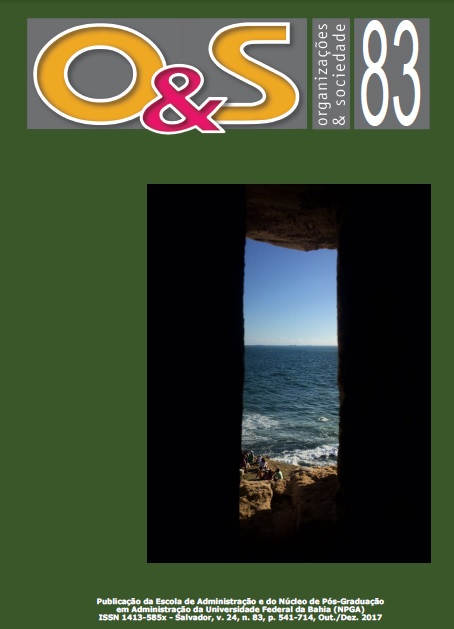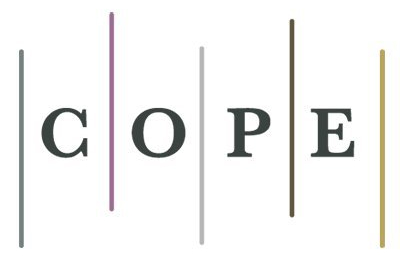Revista Completa
Abstract
This is the second O&S Annual English Edition and the last edition of 2017. We made and implemented many decisions during 2017 aimed at improving our processes regarding the academic community of Administration in Brazil.
One of these decisions was the insertion of our request for authors to possibly translate their articles into English if approved for publishing. Until now, we have avoided this editorial policy because we understand that authors should be free to choose the language in which to publish their works. However, responding to the requirements of our index bases and the demand for internationalization of national journals, our editorial policy is to make authors aware of this possibility when having an article approved for publication by O&S.
This year we initiated and reinforced some important actions, including among others: consolidation of our partnership with IBEPES; approval of the proposal for financial support from CAPES; reduction of operating costs; request for inclusion in the Scopus and EBSCO databases; website improvement.
We conclude 2017 with volume 24, number 83 of O&S positive that we will maintain our level of quality and respect with our authors, evaluators, editors and institutional partners. Moreover, we are proud because O&S has been considered in 14 areas in the latest CAPES evaluation.
The first article, “Mayoral quality and municipal performance in Brazilian local governments”, by Ricardo Corrêa Gomes and Claudia Nancy Avellaneda, tests the influence of managerial quality on organizational performance using a panel data set of 827 Brazilian municipalities from the state of Minas Gerais. After testing for the effect of political, economic, and ideological factors and controlling for other municipal factors, the authors find that mayoral quality fails to explain variance in property tax collection. Rather, political factors (legislature support and electoral cycle) seem to be more strongly correlated with municipal property tax collection.
The second article in this edition, published for Pedro Luiz Costa Cavalcante entitled, “Elections and local government performance in Brazil”, specifically aims to investigate how institutional arrangements and electoral competition affect local government performance. The theoretical basis is electoral democratic theory, which broadly highlights elections as instruments of citizen’s control in retrospective and prospective voting approaches. The empirical evidences suggest that electoral competition does not present direct effect on government performance, however, ideology and citizens’ participation do. Therefore, this paper helps to expand our understanding of political system impact on policy outputs, which is extremely important not only for academic purposes but also for supporting policymakers’ decisions.
The third article, entitled “The scope and implications of spirituality: a dual approach”, by Anselmo Ferreira Vasconcelos, uses a dual approach to shed more light on the topic of spirituality by clarifying what it embraces. It examines the secular literature as well as collects related teachings and tenets from Spiritism Doctrine. The author argues that we live in a suitable moment on this planet to take advantage of the transformative potential derived from spiritual knowledge for the betterment of humanity. The evidence gathered here shows that by developing our own spirituality we can transform ourselves and our creations, including society and institutions.
The fourth article, by authors Silvia Morales de Queiroz Caleman, Guilherme Fowler de Avila Monteiro and George Hendrikse, is “Sustainable food chains: the role of collective action and government incentives”. In this paper, the authors examine the role of collective actions as supporting elements of a long-lasting, sustainable food supply chain. The main contribution of this article is to link the idea of a sustainable supply chain and the collective action problem (horizontal coordination) that maybe required in order to deal with externalities related to the provision of sustainable products. Results show that horizontal mechanisms of cooperation maintain positive levels of sustainability, even in the absence of direct payments by the government.
The fifth article, “Why microfinance institutions exist: lending groups as a mechanism to enhance informational symmetry and enforcement activities”, by Diego Antônio Bittencourt Marconatto, Gilnei Luiz de Moura, Emidio Gressler Teixeira and Luciano Barin Cruz, puts focus on the economic motivation for the existence of microfinance institutions (MFIs). In doing so, the study contributes to the debate regarding why MFIs exist and, especially, what mechanisms are used to address the risks associated with their operation. In examining the reasons why some individuals are regarded as “non-bankable”, the authors lay out the basic economic logic that motivates the exclusion of this population from formal credit markets. Moreover, the authors show how lending group methodology overcomes the credit dilemma which sustains and increases the exclusion of the poorest from these formal credit sources; the increase of both the informational symmetry and the enforcement capacity of MFIs through the enhancement of their screening, monitoring and enforcement activities; and also the importance of context and gender for lending group success.
The sixth paper, entitled “Fair trade in Brazil: current status, constraints and opportunities”, by Marilia Bonzanini Bossle, Daiane Mülling Neutzling, Douglas Wegner and Claudia Cristina Bitencourt, answers the question: “How is fair trade currently organized in Brazil and what are the constraints and opportunities involved?”. The authors analyzed a database of 277 Brazilian organizations linked to fair trade, followed by in-depth interviews with Brazilian experts. Results show that fair trade has grown between 2005 and 2012 due to the support of institutions and public agencies, even if organizations still face financial dificulties. Although it has grown as a public policy, its development has strengthened the concept and the groups involved, providing a good perspective for the internal market. Fair trade has a social role and a political nature, and attracts the attention of policymakers regarding social programs and the support of fair trade organizations.
The seventh paper, “The role of stakeholders in solomon's temple: an exploratory study”, by Roberto Bazanini and Ernesto Michelângelo Giglio, describes the role of stakeholders in the symbolic goods market of religion. Drawing on qualitative research and based on the salience model of stakeholders, the objective is to analyze the importance that Solomon's Temple megachurch has for the Universal Church of the Kingdom of God (UCKG), as a competitive factor for achieving competitive advantage in the market of religious goods and services. Respondents’ perceptions indicate that the construction of megachurches provides a competitive advantage if the stakeholders are identified and continuously monitored, because of the attributes of power, legitimacy and urgency.
“Work-home boundary limits: a study on evangelical pastors' daily lives” is the eighth and last paper, by authors Antonio Carlos Guidi and César Ricardo Maia de Vasconcelos. In this paper, the authors analyze the mutual influence between the process of negotiating work-home boundaries and personal and social identity or, in other words, the method of adapting and managing domestic and professional conflicts which interfere with the harmony of evangelical pastors’ work and personal lives. A qualitative study was conducted in order to achieve the aims proposed, involving an interpretative approach with the pastors of a specific ecclesiastical institution: The Assemblies of God in Brazil. The results reveal that the sharp distinction seen was that the subjects were more likely to mingle interactions in work-home boundaries. The boundary-negotiation tactics were shown to be multi-functional, as they have dual function techniques, used both to segment and integrate the work-home boundary.
We wish excellent reading and our best to all in 2018!
Ariádne Scalfoni Rigo
Editor
Downloads
Downloads
Published
How to Cite
Issue
Section
License
This work is licensed under a Creative Commons Attribution 4.0 License.
The O&S adopts a Creative Commons Attributions License 4.0 in all published works, except where specifically indicated by copyright holders.






